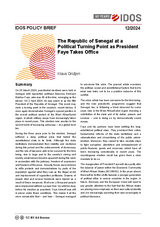The Republic of Senegal at a political turning point as President Faye takes office
Grütjen, KlausPolicy Brief (12/2024)
Bonn: German Institute of Development and Sustainability (IDOS)
DOI: https://doi.org/10.23661/ipb12.2024
Dt. Ausg. u.d.T.:
Die Republik Senegal am politischen Wendepunkt: zum Amtsantritt von Staatspräsident Faye
(Policy Brief 10/2024)
Frz. Ausg. u.d.T.:
La République du Sénégal à un tournant politique: l’investiture du Président Faye
(Policy Brief 13/2024)
On 24 March 2024, presidential elections were held in Senegal, with opposition politician Bassirou Diomaye Diakhar Faye, who was 43 at the time, emerging as the winner. On 2 April 2024, he was sworn in as the fifth President of the Republic of Senegal. This event may mark a turning point in the country’s recent history. It once again demonstrates Senegal’s special position in the overall political context of the West Africa/Sahel region, in which military coups have increasingly taken place in recent years. This election runs counter to the current trend of increasing autocracy – at a global level too. During the three years prior to the election, Senegal suffered a deep political crisis that tested the constitutional state to its limits. Although the state institutions demonstrated their stability and resilience during this period and the achievements of democracy and the rule of law were able to be secured for the time being, due in large part to the country’s strong civil society, weaknesses became apparent during this crisis in connection with the judiciary, freedom of expression and freedom of the press. Security forces used violence to stifle protests and demonstrations by parts of the population against what they saw as the illegal arrest and imprisonment of opposition politicians. Dozens of people died and several hundreds were injured as a result of these measures. Well over a thousand people were imprisoned without a proper trial. Up until ten days before his election as president, Faye himself was still in prison under these conditions. This makes it all the more remarkable that – and how – Senegal managed to overcome this crisis. The present article examines the political, social and constitutional factors that led to what now looks set to be a positive outcome of this conflict. The crisis, which has been overcome for the time being, and the new president’s programme suggest that Senegal, too, is following a trend observed for some years now in the West Africa/Sahel region involving a redefinition of the state and of its duties, powers and services – and is doing so by democratically sound means. Faye and his partners have been battling the long-established political class. They promised their voters fundamental reforms of the state institutions and a rationalisation and streamlining of the public administration. Moreover, they vowed to take resolute steps to fight corruption, clientelism and embezzlement of public finances, goods and resources, which have all been increasing considerably in recent years. The unambiguous election result has given them a clear mandate to do so. The inauguration of President Faye will also partly alter the balance of power within the Economic Community of West African States (ECOWAS). In the years ahead, there will be further shifts towards a younger generation of political elites in various countries in the region. In future, Germany and the European Union will need to pay greater attention to the fact that the African states are placing more emphasis on their own cultural identity and are increasingly asserting their own sovereignty in political discourse.

